
Cognitive Processing
Scope & Guideline
Fostering collaborative insights in cognitive research.
Introduction
Aims and Scopes
- Cognitive Mechanisms and Processes:
The journal investigates various cognitive processes including memory, perception, attention, and decision-making, providing insights into how these mechanisms function in both typical and atypical populations. - Interdisciplinary Research:
Cognitive Processing encourages interdisciplinary approaches, integrating findings from psychology, neuroscience, linguistics, and education to enrich understanding of cognitive phenomena. - Applied Cognitive Research:
The focus extends to applied cognition, exploring practical implications of cognitive research in areas such as education, clinical psychology, and technology, emphasizing how cognitive insights can inform real-world applications. - Developmental and Aging Perspectives:
Research on cognitive development across the lifespan, including studies on children, adults, and aging populations, is a core focus, examining how cognitive abilities evolve and decline over time. - Cultural and Contextual Influences:
The journal also highlights the impact of cultural and contextual factors on cognitive processes, investigating how different environments and cultural backgrounds shape cognition.
Trending and Emerging
- Neuroscience and Cognitive Integration:
An increasing trend is observed in studies that integrate cognitive psychology with neuroscience, exploring how brain mechanisms underlie cognitive processes, enhancing our understanding of the biological bases of cognition. - Cultural and Linguistic Influences on Cognition:
Research focusing on how culture and language shape cognitive processes is gaining traction, indicating a broader interest in the interplay between cognitive functions and sociocultural contexts. - Cognitive Flexibility and Adaptability:
Emerging studies emphasize cognitive flexibility, particularly in relation to decision-making and problem-solving, reflecting a growing interest in how individuals adapt their cognitive strategies in changing environments. - Impact of Technology on Cognitive Processing:
The intersection of technology and cognition, particularly regarding digital environments and their effects on learning and memory, is an increasingly important area of research, addressing contemporary challenges in education and communication. - Mental Health and Cognitive Function:
There is a rising focus on the relationships between cognitive processes and mental health, examining how cognitive distortions and biases influence psychological well-being and vice versa.
Declining or Waning
- Traditional Cognitive Models:
There has been a noticeable decrease in studies relying solely on traditional cognitive models without integrating newer neuroscientific insights, as the field shifts towards more dynamic and integrated approaches. - Focus on Isolated Cognitive Functions:
Research that examines cognitive functions in isolation, such as purely memory or attention studies without considering their interactions with other cognitive processes, is becoming less frequent. - Overemphasis on Laboratory Settings:
There is a waning interest in studies conducted exclusively in controlled laboratory settings, as researchers increasingly favor ecological validity and real-world applicability of cognitive research. - Neglect of Emotional and Social Contexts:
Research that overlooks the emotional and social contexts of cognitive processes is declining, with a growing recognition of the importance of these factors in shaping cognition. - Static Views of Cognitive Development:
The exploration of cognitive development as a static process is diminishing, giving way to more dynamic and context-sensitive approaches that consider the fluidity of cognitive abilities over time.
Similar Journals

JOURNAL OF COGNITIVE NEUROSCIENCE
Exploring the neural pathways of thought.Welcome to the JOURNAL OF COGNITIVE NEUROSCIENCE, a premier publication in the field of cognitive neuroscience, published by the esteemed MIT PRESS. Since its inception in 1989, this journal has been at the forefront of advancing our understanding of the neural mechanisms underlying cognitive processes, boasting an impressive convergence period through 2024. With its Q1 ranking in the 2023 cognitive neuroscience category, it stands out among 115 peers, indicating its critical role in shaping contemporary research. The journal offers a comprehensive array of research articles, reviews, and methodologies aimed at researchers, professionals, and students alike, facilitating the exploration of complex cognitive functions. While not an open-access journal, it provides essential insights and significant contributions to the neuroscience community, making it an invaluable resource for anyone keen on delving into the intricacies of the human brain.

COGNITIVE AFFECTIVE & BEHAVIORAL NEUROSCIENCE
Unraveling the Mind: Where Cognition Meets Emotion and BehaviorCOGNITIVE AFFECTIVE & BEHAVIORAL NEUROSCIENCE (ISSN: 1530-7026, E-ISSN: 1531-135X) is an esteemed journal published by SPRINGER that aims to advance the understanding of the interplay between cognitive processes, affective states, and behavioral responses in the field of neuroscience. Established in 2001, the journal provides a rigorous platform for disseminating high-quality research, with a significant focus on both Behavioral Neuroscience and Cognitive Neuroscience. Classified in Q1 and Q2 quartiles for 2023, it ranks highly within its categories, holding positions of #37 out of 88 and #46 out of 115 respectively in the Scopus listings. Although not an open-access publication, readers can access a wealth of valuable insights and innovative findings that enrich the scientific community's understanding of brain function and behavior. The journal's emphasis on interdisciplinary research contributes to its esteemed reputation, making it a vital resource for students, researchers, and professionals striving to explore the complex nature of the human mind and behavior.
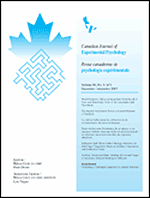
CANADIAN JOURNAL OF EXPERIMENTAL PSYCHOLOGY-REVUE CANADIENNE DE PSYCHOLOGIE EXPERIMENTALE
Innovative Insights into Cognitive ProcessesCanadian Journal of Experimental Psychology / Revue canadienne de psychologie expérimentale (ISSN 1196-1961, E-ISSN 1878-7290), published by the Canadian Psychological Association, serves as a vital resource in the fields of Experimental and Cognitive Psychology and general psychological research. With a respectable impact factor that places it in the Q3 category for both Experimental Psychology and miscellaneous Medicine (2023), this journal offers a platform for innovative research that furthers our understanding of psychological processes. Spanning years from 1993 to 2024, it connects researchers, professionals, and students to contemporary findings and methodologies, fostering a collaborative environment for the advancement of psychological science. Though it does not currently offer Open Access, the journal's commitment to quality and relevance in psychological research continues to make it an important part of the academic landscape, supporting the dissemination of knowledge within a global community.
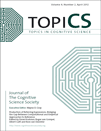
Topics in Cognitive Science
Advancing the Frontiers of Human CognitionTopics in Cognitive Science, published by WILEY, is a premier interdisciplinary journal that advances the understanding of the cognitive processes that underpin human behavior and interaction with technology. With a commendable impact factor and a strong focus on research from 2009 to 2024, this journal garners significant attention in various subfields, as evidenced by its Q1 ranking in Experimental and Cognitive Psychology and Linguistics and Language, alongside a Q2 position in Artificial Intelligence, Cognitive Neuroscience, and Human-Computer Interaction. Researchers and professionals will find invaluable insights into the latest experimental findings, theoretical discussions, and practical applications that bridge cognitive neuroscience, psychology, and computer science. Topics in Cognitive Science is especially pivotal for those aiming to delve deeper into cognitive mechanisms and their implications within our increasingly digital world, making it an essential resource for students and scholars alike.
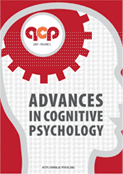
Advances in Cognitive Psychology
Illuminating the Pathways of the MindAdvances in Cognitive Psychology is a premier peer-reviewed journal published by UNIV ECONOMICS & HUMAN SCIENCES WARSAW, dedicated to the exploration of psychological processes underlying cognition. With its open access model implemented since 2005, the journal facilitates wide-ranging dissemination of cutting-edge research across various branches of psychology, including applied, clinical, experimental, and cognitive psychology. Despite its modest standing in terms of impact factor, reflected in its Q3 and Q4 rankings across numerous subfields, it remains an important platform for emerging researchers and seasoned professionals alike, aiming to foster insight into complex mental processes and enhance understanding of behavioral patterns. The journal's commitment to accessibility empowers a diverse community of readers, including students, to engage with innovative studies and reviews, contributing to the collective knowledge within the psychological sciences. Located in Poland, Advances in Cognitive Psychology is open for submissions from worldwide researchers, encouraging a global perspective on cognition and behavior.
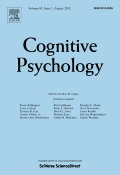
COGNITIVE PSYCHOLOGY
Exploring the Depths of Human CognitionCOGNITIVE PSYCHOLOGY is a premier academic journal published by Academic Press Inc. Elsevier Science, specializing in the dynamic and evolving field of cognitive psychology. With a significant history spanning from 1970 to 2024, this journal has established itself as a critical resource for researchers and professionals alike, boasting a distinguished ranking in the Q1 category across multiple disciplines, including Experimental and Cognitive Psychology, Neuropsychology, and Artificial Intelligence. Its impact factor, reflective of its influence and reputation within the academic community, positions COGNITIVE PSYCHOLOGY as an essential platform for disseminating cutting-edge research and theoretical advancements. Although it is not open access, subscribers gain exclusive insights into the latest findings that drive the field forward. The journal's commitment to fostering innovative research makes it an indispensable tool for those dedicated to understanding the complexities of human cognition.

Journal of Neuropsychology
Exploring the Neural Basis of Behavior and CognitionThe Journal of Neuropsychology, published by WILEY, is a premier academic journal dedicated to advancing the field of neuropsychology and its related disciplines. With a focus on behavioral and cognitive neuroscience, this journal presents cutting-edge research that informs our understanding of psychological functions and their underlying neural mechanisms. Operating with an impressive impact factor representative of its rigorous peer-review process, the journal has established itself within the Q2 and Q3 quartiles of multiple relevant categories, including Neuropsychology and Physiological Psychology. Researchers will find the ISSN 1748-6645 and E-ISSN 1748-6653 useful for academic referencing as they explore articles that span innovative methodologies and insights into neurological conditions. Published continuously since 2007, the Journal of Neuropsychology stands as a vital resource for professionals and students alike, fostering scholarly discourse and knowledge exchange in neuropsychological research.
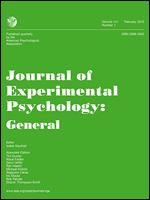
JOURNAL OF EXPERIMENTAL PSYCHOLOGY-GENERAL
Connecting Theories with Empirical EvidenceJOURNAL OF EXPERIMENTAL PSYCHOLOGY-GENERAL, published by the American Psychological Association, is a leading journal in the field of experimental and cognitive psychology. With an ISSN of 0096-3445 and a robust impact factor that reflects its significant contribution to research, this journal serves as a premier outlet for empirical studies that advance our understanding of psychological processes across development and cognition. Covering a wide array of topics from developmental neuroscience to general psychology, it is categorized in the Q1 quartile across multiple fields, making it a vital resource for researchers, professionals, and students alike. The journal has maintained a consistent publication record since its inception in 1975, continuously freeing insights that shape the future of psychology and related disciplines. With rigorous peer review and high standards of scholarly excellence, JOURNAL OF EXPERIMENTAL PSYCHOLOGY-GENERAL remains an essential platform for disseminating innovative psychological research.

PSYCHONOMIC BULLETIN & REVIEW
Unveiling the Complexities of Mind and Behavior.PSYCHONOMIC BULLETIN & REVIEW is a premier journal published by SPRINGER, dedicated to advancing the fields of psychology, particularly within the domains of Arts and Humanities, Developmental and Educational Psychology, and Experimental and Cognitive Psychology. With its ISSN 1069-9384 and E-ISSN 1531-5320, the journal serves as a vital resource for researchers, professionals, and students striving to stay at the forefront of psychological science. The journal boasts an impressive impact factor and ranks in the top quartile (Q1) in relevant categories, reflecting its prestigious standing in the academic community. Covering research from 1994 to 2024, it offers rich interdisciplinary insights into psychological processes and theoretical developments, supporting researchers in disseminating their findings effectively. While not an open-access journal, it provides various access options to ensure that vital research remains within reach of its audience. With a commitment to fostering scholarly dialogue and innovation, PSYCHONOMIC BULLETIN & REVIEW plays an indispensable role in shaping contemporary psychological discourse.
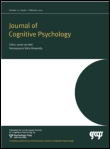
Journal of Cognitive Psychology
Illuminating the pathways of human cognition.Journal of Cognitive Psychology is a premier peer-reviewed journal published by Routledge Journals, Taylor & Francis Ltd, located in the United Kingdom. With an ISSN of 2044-5911 and E-ISSN 2044-592X, this journal is dedicated to advancing the field of cognitive psychology by disseminating high-quality research findings and theoretical insights. Spanning from 2011 to 2024, the journal occupies a significant position in its field, classified in the Q3 quartile for 2023 in Experimental and Cognitive Psychology, and ranked #117 out of 165 in the Scopus database, indicating its relevance and contribution to the discipline. The impact factor reflects its evolving nature and the increasing interest in cognitive processes, making it a vital resource for researchers, professionals, and students alike. As the landscape of cognitive psychology continues to grow, the journal remains committed to exploring cutting-edge topics and methodologies, while engaging with dynamic challenges associated with cognition and behavior. Readers are encouraged to utilize the Open Access options available, ensuring seamless accessibility to this crucial body of work.